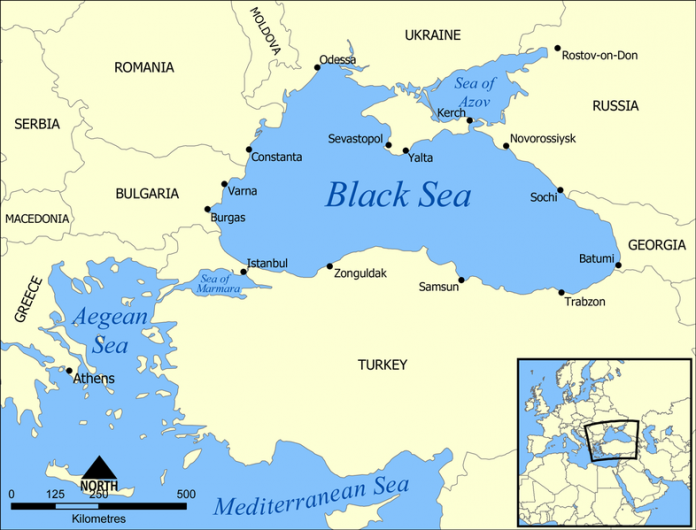When I was a child, I always wondered why the Black Sea was called “black”; as this name conjured up in my mind a dark, turbid and muddy body of water. Years later, when I saw the Black Sea I was pleasantly surprised; it was greenish blue and beautiful. Although my worry had been dispelled, the question that gnawed at my mind was not answered… until I came across an article in the New York Times. According to that article, the ancient Turks referred to the Northern direction as “black”, to the South as “white”, to the East as “red.” This explanation seemed logical as we call the Mediterranean “Akdeniz”, and the Red Sea is in the East.
The latest news about this beautiful sea are rather gloomy. As the modern world is plagued with the side-effects of the advanced technology and the ever-increasing world population, these facts take their toll on the air we breath, on our water, and soil. According to the reports, the Black Sea is on the verge of dying, as it succumbs to relentless assaults of the toxic waste as well as human waste dumped by the four major rivers, Danube, Don, Dnieper and Dniester. When the Chernobyl disaster occurred in 1986 in the former Soviet Union, now in Ukraine, the Dnieper river dumped radioactive fallout to the Black Sea, which was a major catastrophe with wide-spread effect on the entire eco system of the region. In addition to these main waterways, large and small some 60 rivers and streams deliver tons of waste and toxic materials from an area inhabited by about 160 million people. Turkey has three major rivers pouring into the Black Sea: Sakarya river, Kizilirmak and Yesilirmak – but none of them carries any toxic waste.
The river Danube is cited as the main culprit that pollutes the Black Sea. It sweeps through the Central and Eastern Europe, and carries oil, lead, phosphorus and nitrates from farm discharge, and such industrial wastes like chromium and cadmium from Germany, Austria, Hungary, Yugoslavia, Bulgaria, Romania and Moldova to the Black Sea. In addition, the Black Sea has been a dumping ground of the oil tankers and the freighters. They clean out their oil tanks, flush their ballasts, dump loads of dangerous sludge and waste with impunity, and gradually turn it into a cesspool. Also, with these ballasts tons of jellyfish from Atlantic ocean have been brought to the Black Sea. This new specimen, 4 inches long, is foreign to Black Sea, and thrives on polluted waters, and devours all fish eggs and the plankton on its path. This is another cause that brings the Black Sea on the verge of dying. Once seals and dolphins, caviar and fish were so plentiful, now they are endangered species, and no one had thought such bounty could ever depleted.
There are scientific findings that the Black Sea is rapidly losing its oxygen and its ability to purge itself. The oxygenated segment, which is only about 300 feet deep, seals off huge hydrogen sulfide and methane segment underneath, but with the dramatic decrease in the living organisms these oxygen carrying elements are rapidly disappearing. Researches indicate that today the Black Sea is four times more polluted than the Mediterranean. According to the Turkish government the Black Sea catch dropped almost 95 percent during the last years, from 340,000 tons per year to 15,000 tons.
Although this problem may seem like a regional issue, in the broader perspective it is an environmental emergency case which affects large segment of the population as well as our natural resources. With the ever increasing awareness in ecology, the affected countries need to focus on this common problem, because if not worked out judiciously every country will share in the disaster. It is time to cooperate across the borders to save the beautiful Black Sea.
AYHAN OZER
October 1991

